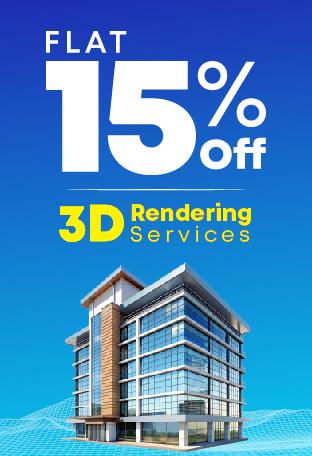Immersive visualization. Streamlined processes. Sustainable solutions.
There are numerous advantages to implementing the latest developments in architectural technology. As they grow more advanced, so do our solutions for a warming planet and increasingly interconnected world.
For example, Building Information Modeling (BIM) in construction helps everyone working on a project to remain on the same page, thus helping to avoid mistakes due to miscommunication.
In this article, we’ll take you through six pieces of architecture technology that are helping to shape the way we live.
Table of Contents:
Self-Healing Concrete
Universities all over the world are constantly researching alternative building materials that will help solve today’s problems. Self-healing concrete is one of the latest of construction technologies.
For example, researchers from the School of Engineering at the University of Cardiff have worked on on developing technology through a project called Materials for Life.
They delineated three technologies of self-healing concrete.
The first type uses shape-memory polymers. These are shape-shifting materials that can fix large cracks in concrete. This occurs when a small current is sent through the materials.
The second type involves pumping healing agents that are both inorganic and organic into slim shafts in the concrete.
The final type embeds small capsules that contain healing agents and bacteria into the concrete. When cracks occur, the agents and nutrients will help produce calcium carbonate to fill the cracks.
“Our vision is to create sustainable and resilient systems that continually monitor, regulate, adapt and repair themselves without the need for human intervention,” stated Professor Bob Lark, the principal investigator on the project, in a press release.
Bioplastics
Arguably the most pressing concern that high tech architecture needs to address is our deteriorating environment.
Plastic is one of the most environmentally damaging materials on earth, but it may not be for much longer thanks to a type of green building technology.
Researchers from Harvard University’s Wyss Institute for Biologically Inspired Engineering have developed a fully biodegradable bioplastic technology made from shrimp shells.
The Wyss Institute team found a way to process the material so it can be applied to large manufacturing projects. This enables organizations to create a vast array of complex 3D objects with traditional manufacturing techniques.
Furthermore, when returned to the environment, the bioplastic breaks down within two weeks and functions as a natural fertilizer that supports plant growth.
“There is an urgent need in many industries for sustainable materials that can be mass produced,” remarked Founding Director Don Ingber, M.D., Ph.D.
Recommended Reading:
Structural 3D Printing
3D printing has officially been integrated into the building industry. (You’ve probably heard of 3D printed homes!)
In October 2015, the Dutch 3D manufacturing company MX3D and designer Joris Laarman proposed the MX3D Bridge: the world’s first 3D-printed bridge.
Laarman’s design was for a 26.2 ft. by 13.1 ft. pedestrian bridge that would cross one of Amsterdam’s historic waterways, the Oudezijds Achterburgwal canal. The structure was made using steel and MX3D’s multi-axis metal-printing technology.
According to the company: “This bridge will show how 3D printing finally enters the world of large-scale, functional objects and sustainable materials while allowing unprecedented freedom of form.”
Backed by the likes of Autodesk and Lenovo, the future of this technology seems bright indeed.
Of course, not all architecture firms can justify purchasing such high-cost, large-scale printers for their own projects – but there is hope that this may not be the case for long.
The tech company Formlabs developed Form 2, a high-end 3D printer compact enough to sit on your desktop. The machine produces resin components for both large, solid parts and intricate scale model details.
Starting at $3,500, it’s a relatively affordable alternative for any company looking into 3D printing for construction.
Virtual Reality (VR)
No article about architecture technology is complete without a section on VR.
VR in architecture is not new, but it’s still going strong, thanks to its ability to provide a 1:1 scale model of designs. The compound annual growth rate for the VR market between 2020 and 2027 is 21.6%.
The latest VR software not only enables clients to fully immerse themselves in a project viewing, but also allows designers to work on their designs in a virtual environment.
This architecture technology is creating new levels of holistic planning and collaboration. Make sure the 3D rendering services you hire meet those standards!
Recommended Reading:
Ultra High-Res Aerial Photography
For the past few years, Google Earth Pro has been the primary resource for architectural site exploration and analysis in the research and design process. However, its competitor Nearmap is giving it a run for its money.
Nearmap offers frequently updated imagery at a resolution several times clearer than even satellite imagery.
It also provides full integration with CAD programs that open up possibilities for visual analytics, precise measurements, and virtual presentations.
Furthermore, their catalog of historical imagery allows you to track a site’s progress over time instantly.
These industry-specific tools will be instrumental in the future of site planning, project development and marketing strategies.
Construction Drones
Drones are now becoming the standard for construction site surveillance. They lead to better safety conditions, improved accuracy in reports, and lower costs.
This is important, because a typical commercial construction project will go 80% over budget and be 20 months late.
At the Autodesk University convention, Architizer reported 3DR Site Scan technology. This tech would make it possible for architects to capture on-site conditions and import the data into their CAD software for immediate analysis.
Companies like Topcon and 3D Robotics are paving the way for drone technology to reach new heights of detail and clarity.
Conclusion
As long as humans exist, our architecture technology will not stop evolving.
And if you’re looking for someone to implement all that tech for you? You needn’t look further.
BluEntCAD is a leading CAD drafting and architectural rendering company that has served most major US homebuilders since its conception in 2003.
We continue to serve homebuilders, real estate developers, commercial architects, interior designers, and engineering companies.
Our CAD designers, Revit draftsmen and BIM consultants approach design through practices based on integrating building systems, sustainable design principles and extensive construction knowledge.
But don’t take our word for it. Go through our portfolio.
Ready to take your construction project to the future with the latest in architecture technology? Contact us now!
Maximum Value. Achieved.

















 Professional 3D Living Room Visualization: 6 Ways BluEnt Helps Interior Designers Win Client Approvals
Professional 3D Living Room Visualization: 6 Ways BluEnt Helps Interior Designers Win Client Approvals  Freelancer or Visualization Studio or In-House Team: What Brings More Value for Builders and Developers
Freelancer or Visualization Studio or In-House Team: What Brings More Value for Builders and Developers  6 Correct Ways to Use 3D Animation Video for Real Estate Advertising to Boosts Sales?
6 Correct Ways to Use 3D Animation Video for Real Estate Advertising to Boosts Sales?  Showcase Commercial Real Estate Like Never Before: The Developer’s Guide to Standing Out
Showcase Commercial Real Estate Like Never Before: The Developer’s Guide to Standing Out